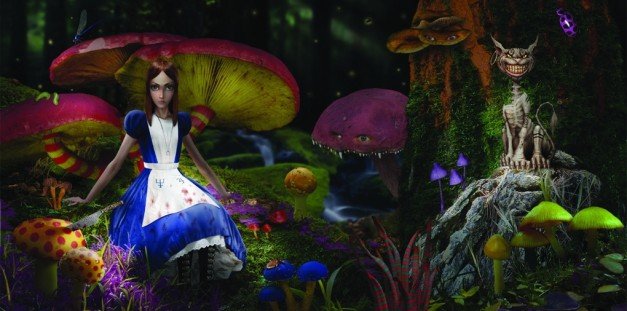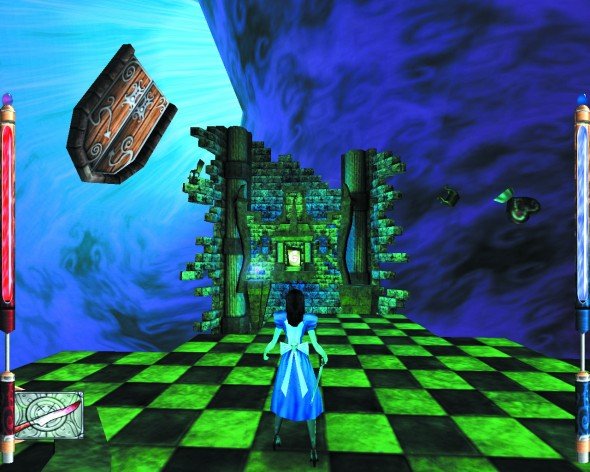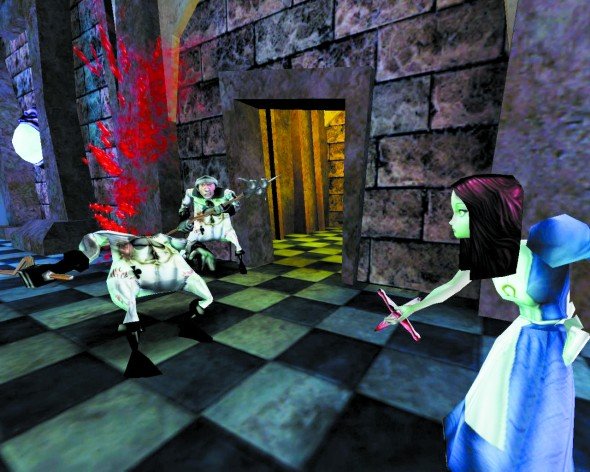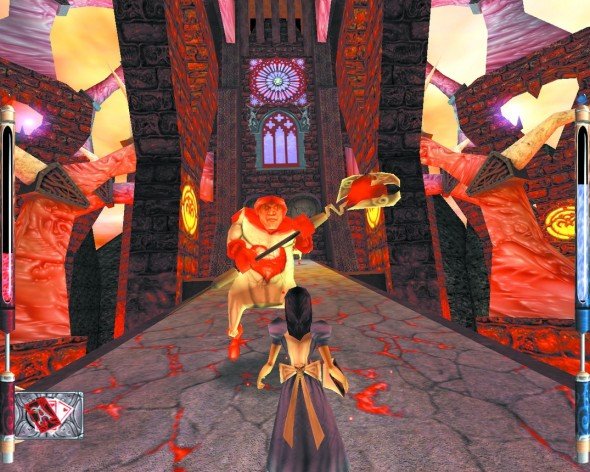American McGee's Alice rose above other 'dark Alice' adaptations by letting us discover Wonderland on our own
Reinstall – American McGee's Alice.

Lewis Carroll's Alice's Adventures in Wonderland has spent the past 150 years casually batting aside just about every attempt to reshape its capricious, meandering story into a logical narrative. Tim Burton gave it a crack, tossing 19-year-old Alice back into the phantasmagorical fantasies of her childhood to ditch the hoop skirts, confront the Red Queen, and transition to spirited, headstrong womanhood while name-checking Carroll's cast along the way. The result was charmless and distasteful. So what a coup it might have been if EA had re-released American McGee's Alice at the same time, and showed how a young PC game developer had taken a suspiciously similar approach 10 years earlier—and made it work.
McGee's Alice, now in her late teens, had been traumatized by the loss of her family in an accidental fire and spent a decade cozily detached from reality in Rutledge Asylum until the White Rabbit beckons again. But the Wonderland he leads her back to has become a far more grisly scene than the last time she visited. Armed at first only with her Vorpal Blade and native haughtiness, she makes her way through the game's nine distinct provinces, at once retracing steps from her previous adventures and at the same time, slowly and painfully coming to grips with the unacceptable reality that lay outside of Wonderland.

The Blight Rabbit
Like innumerable adaptations we've seen over the years, American McGee's Alice whisks us through encounters with the Mock Turtle, the pepper-wielding Duchess, the Caterpillar, the Tweedle bros., the Mad Hatter, the Jabberwock and, of course, the wicked Red Queen herself—in all of her manifestations. As such, it doesn't sound much different than what Burton did—except that once McGee introduces us to his oppressive Wonderland, he supplies us with a few neat tricks (like using our skirt to float over gaps) and with a gentle pat on the butt, sets us free to explore and discover the world on our own.
And, what a world. Columns of rotating clockwork gears. Bombardier ladybugs. Creaky automatons. A chessboard realm in which Alice herself must become a chess piece—subject to chess rules—in order to pass. Acres of foliage in which smartly waistcoated grasshoppers lie in wait to toss Alice unceremoniously into a nearby river.
With its heavily stylized environments drenched in hypnotic, vibrant, swirling colors, American McGee's Alice has the distinction of being one of the few games to boast extremely high production values that, years later, still look nearly as luscious today as they did then. These include its beautifully detailed animations—step away from the keyboard and let Alice get bored while she's holding any of her weapons, for example, and see what she gets up to.
But as lovely as the graphics were—and still are—Chris Vrenna's soundtrack contributes at least as much to the game's rich, intensely evocative ambiance. It's initially breezy and whimsical as the original novel itself at times, but later, it's as if a maniac is loose in our memories knocking over everything in his path: music boxes, bells, ticking clocks, burbling teapots, crazy Aunt Edna's glockenspiel. There are often no clear demarcations between Vrenna's compositions and the groan of twisting wood or children shrieking madly in their cells in the background—they're woven into a smooth, menacing tapestry of sound.

Riding the Blunderbuss
Despite McGee's pedigree in seminal shooters such as Doom and Quake, the enjoyment of combat in Alice comes more from whimsy than tactics: once you've pegged a creature's or boss's patterns—which you'll do very quickly—it is from there more a matter of deciding whether to soften them up with the Croquet Mallet and then clean up with your Ice Wand, or follow a volley from the Blunderbuss with a hailstorm of Cards from a comfy distance. Victory tops up Alice's health, or meta-essence to power her weapons, or both, and along her way she'll pick up a few clever power-ups, including one that transforms her from a polite young lassie with a knack for blade handling into a hellish bug-like demon that deals mega damage with no manners.
Keep up to date with the most important stories and the best deals, as picked by the PC Gamer team.
But while combat isn't at the heart of what makes American McGee's Alice such an exemplary, timeless game, Alice's confrontation with the Red Queen delivers a strong emotional climax to the experience. Surely GLaDOS took a few cues from this homicidal harpy: confronted by a young woman whose adventures have emboldened her, the Queen first hisses warnings, then humiliations, then accusations, and finally outright threats. But her most telling epithet is this: “I rule Wonderland alone.” And here the game delivers the hefty payoff that, for example, Burton's movie couldn't. Because Alice's struggle has been literally our own struggle throughout the entire game, so naturally our response to the Red Queen, even when she warns that her destruction will be our own, is to whip out the Jabberwock staff and take the bitch out.

What's in a Name
Whether Alice's Adventures in Wonderland was a whimsical daydream committed to paper, a feisty professor's rebellion against the rigidity of mathematics, or a chaste love letter to a young Alice Liddell, American McGee's Alice is not an adaptation of that beloved novel. It is its own game, and I doubt it was hubris that led American McGee to put his name right there in the title. Instead, it's an acknowledgment; McGee took somebody else's characters and familiar scenarios and cannily transformed them into something new, fresh, and contemporary.

